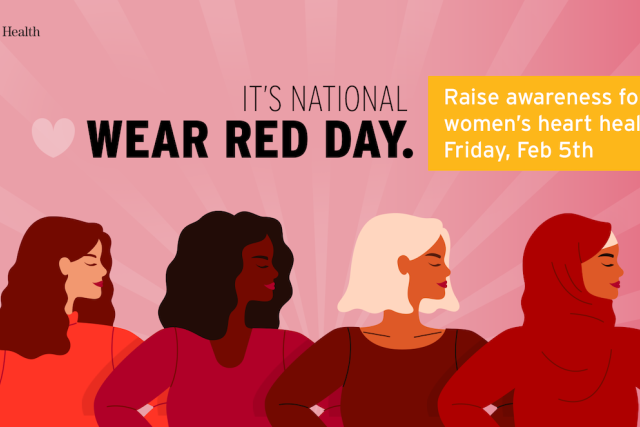This year’s National Women Wear Red Day, marked by health organizations around the country to spread awareness of heart disease, takes place on Friday, Feb. 5. One of those organizations, the American Heart Association (AHA)’s Go Red for Women campaign has promoted education around the risk factors of cardiovascular disease and stroke for women since 2004.
“Women tend to believe breast cancer is their biggest threat, but heart disease kills more women than ALL forms of cancers combined. Heart disease claims the lives of one in three women, killing one woman about every 80 seconds,” says Janki Shah, MD, assistant professor and director of the Northwest Women’s Heart Health Program at UCLA.
Though there have been significant advancements in clinical care and research, Dr. Shah says cardiovascular disease in women under 55 years of age has begun to trend upward. While more research is needed to understand why cases are rising, several factors such as diabetes, poor dietary habits and a sedentary lifestyle may contribute.
Symptoms and risk factors
What is unique about cardiovascular disease is the way it presents in patients.
While some women may experience angina, or chest pain, others may experience pain in the upper neck, jaw, throat, abdomen or back. Symptoms may even just be shortness of breath, breaking out in a cold sweat, nausea, or excessive fatigue.
Other times, heart disease is “silent” and goes unnoticed until an emergency hits, such as a heart attack, stroke or cardiac arrest.
High blood pressure, high cholesterol, diabetes, smoking, being overweight and excessive alcohol consumption greatly increase the risk of cardiovascular disease.
The Go Red campaign recommends women learn these four health numbers to assess their risk: blood pressure, total cholesterol, blood sugar and Body Mass Index (BMI).
Dr. Shah says women need to discuss these numbers and their family history with their primary care doctors because, “despite doing everything right, if they have a really strong family history, they are still at high risk for cardiovascular disease.”
Reducing the risk
Fortunately, 80% of cardiac events are preventable with education and lifestyle changes. The American Heart Association recommends the following guidelines:
- Stop smoking. It increases the risk for heart disease and stroke by two to four times.
- Get and stay active. The Centers for Disease Control and Prevention (CDC) recommend 150 minutes of exercise each week for adults.
- Maintain a healthy weight.
- Eat healthy foods. Dr. Shah recommends a Mediterranean diet, filled with fruits vegetables, whole grains, beans, legumes, fish and poultry.
UCLA Health programs for prevention
Cardiologists at the UCLA Women’s Cardiovascular Center have developed many programs to raise awareness, provide education and training, and manage and treat cardiovascular disease.
The Early Cardiovascular Health Outreach SMS (ECHOS) Program uses text messaging to combat cardiovascular disease and loneliness during the COVID-19 pandemic. Loneliness and social isolation may be associated with adverse cardiovascular risks, studies show. To promote heart health and mitigate feelings of loneliness, the ECHOS program sends participants a series of surveys, which prompt daily reminders. Participants are eligible for small prizes, such as gift cards.
The Barbra Streisand Women's Heart Health Program organizes community outreach to engage women of all ages and backgrounds on the importance of annual screenings and preventative measures.
“Let’s Talk: Heart, Body and Soul” is a free community event that brings together female cardiologists to discuss healthy habits. This annual event has been postponed due to the pandemic, but may return in a virtual format.
Dr. Shah, who served as the medical chair for the Feb. 2020 Ventura County Go Red for Women Luncheon sponsored nationally by CVS Health and locally by UCLA Health and other health care organizations, says the social connections forged within the community are what she misses the most about the “Go Red” events.
“When we get the word out to women, they share it with their mothers, daughters, friends, golf partners, card buddies, and the awareness is spread further.”
This year, Los Angeles and Ventura counties will combine efforts: the Los Angeles/Ventura County Go Red event will be held virtually on April 9, providing an opportunity to raise awareness while staying healthy and safe.
UCLA Health partners with the American Heart Association for several community programs and events, and is a proud recipient of $4.7 million in research grants. Last year, UCLA received Gold-level recognition from the AHA’s 2020 Workplace Health Achievement Index and raised $54,090 for the AHA Heart and Stroke Walk on Oct. 10.
For healthy heart tips, recipes and prevention-related tools, visit UCLA Women’s Cardiovascular Center.



